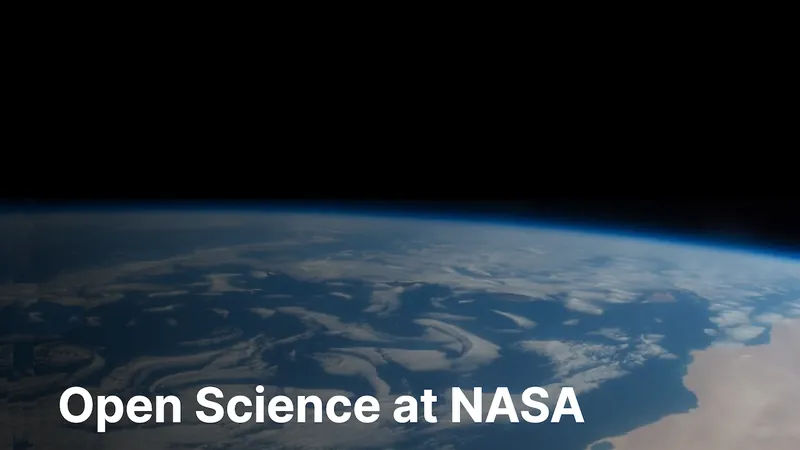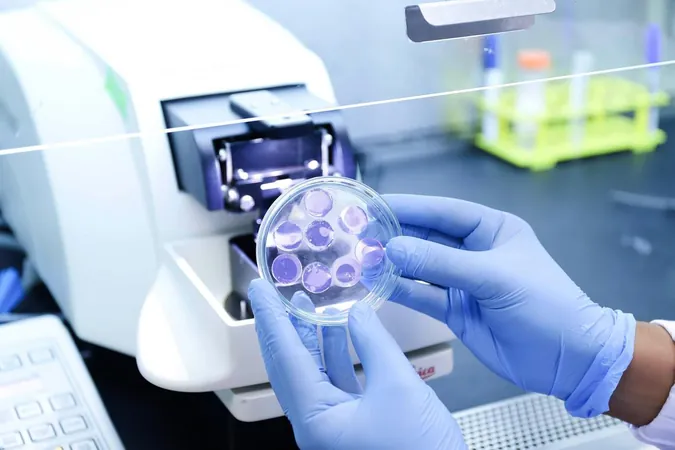
Unlocking the Cosmos: How AI and Open Science Are Revolutionizing Astrobiology
2025-05-24
Author: Jia
The Crossroads of Astrobiology and Innovation
Astrobiology straddles multiple scientific disciplines as it delves into the origin, history, and future of habitable planets and life itself. The field’s unique complexity invites a groundbreaking approach through the latest advancements in artificial intelligence (AI) and machine learning (ML), which are poised to uncover intricate connections within vast datasets.
AI's Role in Discovering New Worlds
Recent applications of AI in astrobiology have already showcased remarkable capabilities. From analyzing Raman spectra to identify habitability-related minerals to classifying exoplanets through Kepler and TESS transit signals, the power of AI is drastically enhancing our understanding of life's possibilities across the universe.
Harnessing Multi-Modal Data for a Deeper Insight
Leveraging multi-modal data such as imagery, spectroscopy, and metagenomics can help explore the boundaries that define life. However, to fully exploit AI's potential in this field, scientists must ensure that the data collected is robust, comprehensive, and compatible across various formats.
The Open Science Revolution: Collaboration Is Key
The move towards open science, as exemplified by NASA's initiatives, is fundamentally changing how research data is shared and utilized. By adhering to the FAIR principles—ensuring data is Findable, Accessible, Interoperable, and Reusable—astrobiology stands to gain significantly through enhanced collaboration and reduced redundancies.
Identifying Data Gaps: A Community Challenge
Despite significant efforts to build local data ecosystems within astrobiology, persistent gaps in quality and quantity remain. Scientists must create a unified standard for accessing existing data, which will enable them to mine for valuable insights crucial for future explorations.
Recommendations for Advancing Astrobiology Data Collection
To bridge these gaps, various initiatives are suggested, such as forming expert working groups to standardize data collection protocols and create cross-disciplinary ontology. This collaborative effort will pave the way for an efficient astrobiology data ecosystem that supports the integration of new findings.
Accessing Unique Samples and Instruments: A New Frontier
Access to specialized instruments that investigate astrobiological signatures is crucial. However, these tools are often restricted to mission-critical experiments. Establishing community access models and archiving systems for physical samples from field sites will empower researchers to maximize their contributions.
Breaking Down Barriers: Elevating the Astrobiology Community
Changing attitudes toward data management is essential. Creating a comprehensive list of astrobiology-specific repositories, coupled with targeted funding for data preparation, will support researchers in making their findings accessible and impactful.
Conclusion: The Future of Astrobiology Awaits
As we stand on the brink of an AI-driven era in astrobiology, the potential to unlock the mysteries of life beyond Earth is greater than ever. By prioritizing open science and fostering collaboration, we can ensure that the knowledge gained not only enhances our understanding of our own planet but also illuminates the cosmos. The time to innovate is now!




 Brasil (PT)
Brasil (PT)
 Canada (EN)
Canada (EN)
 Chile (ES)
Chile (ES)
 Česko (CS)
Česko (CS)
 대한민국 (KO)
대한민국 (KO)
 España (ES)
España (ES)
 France (FR)
France (FR)
 Hong Kong (EN)
Hong Kong (EN)
 Italia (IT)
Italia (IT)
 日本 (JA)
日本 (JA)
 Magyarország (HU)
Magyarország (HU)
 Norge (NO)
Norge (NO)
 Polska (PL)
Polska (PL)
 Schweiz (DE)
Schweiz (DE)
 Singapore (EN)
Singapore (EN)
 Sverige (SV)
Sverige (SV)
 Suomi (FI)
Suomi (FI)
 Türkiye (TR)
Türkiye (TR)
 الإمارات العربية المتحدة (AR)
الإمارات العربية المتحدة (AR)